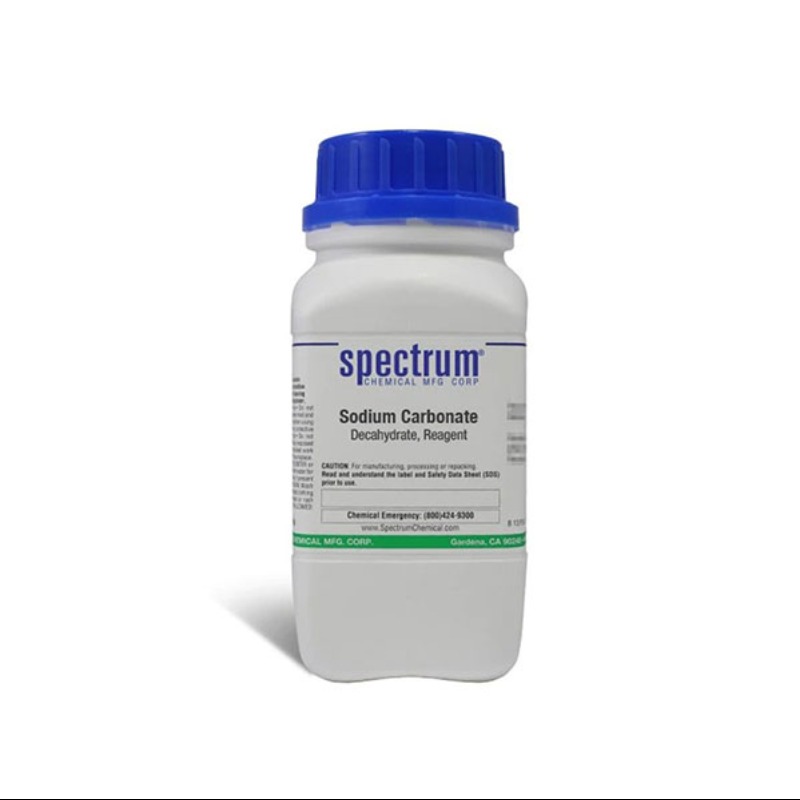Sodium carbonate decahydrate
সোডিয়াম কার্বনেট একটি শক্তিশালী ক্ষার বেস যা সবুজ পরিষ্কারের পণ্যগুলিতে ব্যবহৃত হয়। প্রায়শই গুঁড়ো আকারে পাওয়া যায়, এটি বিস্তৃত শিল্পগুলিতে ব্যবহার করা হয়, যেমন পরিষ্কার এবং ব্যক্তিগত যত্ন পণ্যগুলিতে এবং ছত্রাকনাশক, মাইক্রোবাইসাইড, হার্বিসাইড এবং পিএইচ অ্যাডজাস্টার হিসাবে।
Sodium carbonate decahydrate lab grade
Chemical Properties
white small crystalsChemical Properties
Sodium carbonate is a white, almost white, or colorless inorganic salt, produced as crystalline powder or granules. It is hygroscopic and odorless with an alkaline taste.Uses
Washing textiles, bleaching linen and cotton, general cleanser.Uses
Sodium carbonate decahydrate is used as a raw material in various industries like glass, paper making, soap, detergent, textile and leather. It is also used as a food additive. It is also involved as a precipitation agent of carbonate as well as an analytical reagent in laboratories. It plays an important role as strong base and powerful electrolyte. It finds application in metal refining and cement production.Production Methods
Sodium carbonate is produced by the ammonia-soda process, also known as the Solvay process.Pharmaceutical Applications
Sodium carbonate is used as an alkalizing agent in injectable, ophthalmic, oral, and rectal formulations. In effervescent tablets or granules, sodium carbonate is used in combination with an acid, typically citric acid or tartaric acid. When the tablets or granules come into contact with water, an acid– base reaction occurs in which carbon dioxide gas is produced and the product disintegrates. Raw materials with low moisture contents are required to prevent the early triggering of the effervescent reaction.As an alkalizing agent, concentrations of sodium carbonate between 2% and 5% w/w are used in compressed tablet formulations. As an effervescent agent, concentrations of sodium carbonate up to 10% w/w can be used.Therapeutically, sodium carbonate is also used as an oral antacid.Safety
Sodium carbonate is used in injectable, oral, and rectal pharmaceutical formulations. The pure form of sodium carbonate is mildly toxic by ingestion, moderately toxic by inhalation and SC routes, and very toxic by the IP route. It is irritating to the skin and eyes. Dust and vapors of sodium carbonate may irritate mucous membranes, causing coughing and shortness of breath. It also has experimental reproductive effects.Sodium carbonate can migrate to food from packaging materials. When used as an excipient or antacid, sodium carbonate is generally regarded as a nontoxic and nonirritating material.LD50 (mouse, IP): 0.12 g/kgLD50 (mouse, SC): 2.21 g/kgLD50 (rat, oral): 4.09 g/kgstorage
Sodium carbonate converts to the monohydrate form when in contact with water and produces heat. It begins to lose carbon dioxide at temperatures above 400℃ and decomposes before boiling. Store in airtight containers.Incompatibilities
Sodium carbonate decomposes when in contact with acids in the presence of water to produce carbon dioxide and effervescence. It may react violently with aluminum, phosphorous pentoxide, sulfuric acid, fluorine, and lithium.Regulatory Status
GRAS listed. Accepted for use as a food additive in Europe. Included in the FDA Inactive Ingredients Database (injections; ophthalmic solution; oral capsules and tablets; rectal suspensions). Included in the Canadian List of Acceptable Non-medicinal Ingredients. Included in parenteral (powder for solution for injection) and nonparenteral medicines (oral effervescent tablets, soluble tablets, granules, lozenges, chewing gums) licensed in the UK.USP32–NF27 allows either the anhydrous or the monohydrate form.
If you'd like to know more about this chemical or need any analysis
report regarding this chemical then contact us support@echem.com.bd.
Sodium carbonate decahydrate, commonly known as washing soda or soda crystals, is a hydrate salt with the chemical formula Na2CO3·10H2O. Here are some key features of sodium carbonate decahydrate for lab grade use:
Chemical Formula: Na2CO3·10H2O
- This indicates that each molecule contains two sodium atoms (Na), one carbonate ion (CO3), and ten water molecules (H2O).
Physical Appearance:
- Sodium carbonate decahydrate typically appears as white, odorless crystals or powder.
Solubility:
- It is highly soluble in water, forming an alkaline solution.
pH:
- In solution, it exhibits alkaline properties with a pH around 11-12.
Hygroscopic Nature:
- It has a high affinity for water and readily absorbs moisture from the atmosphere, which can affect its weight and handling properties.
Applications:
- Sodium carbonate decahydrate is commonly used in laboratory settings for various purposes:
- As a buffering agent to maintain pH in certain chemical reactions.
- In the preparation of standard solutions.
- In qualitative analysis to precipitate certain ions.
- In the synthesis of other compounds.
Safety Considerations:
- While sodium carbonate decahydrate is generally considered safe to handle, it is still important to follow proper safety protocols when working with any chemical substance.
- Avoid contact with skin and eyes, and use appropriate protective equipment such as gloves and goggles.
- It is also important to store it in a dry environment to prevent absorption of moisture.
Storage:

Login To Comment